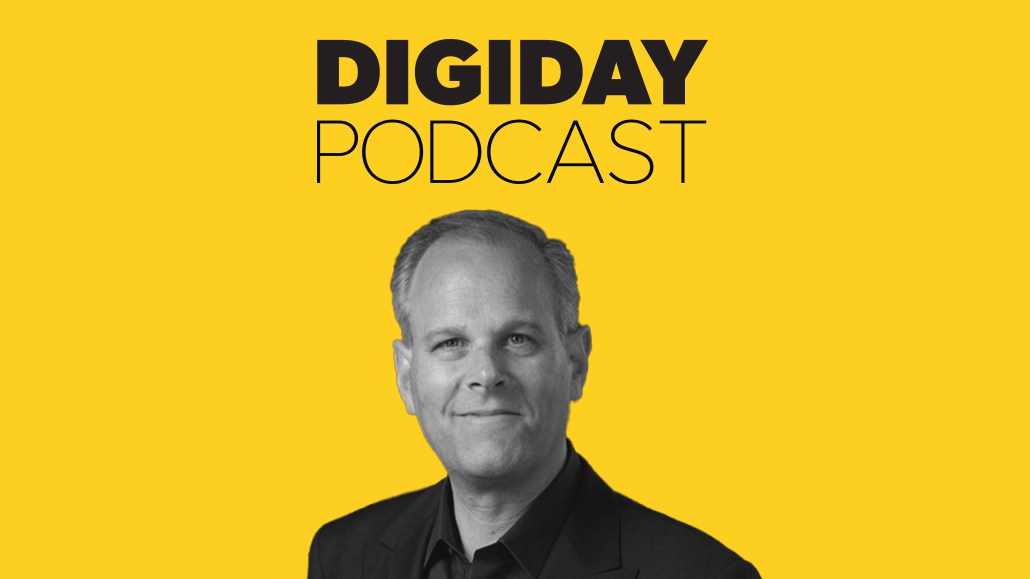Secure your place at the Digiday Media Buying Summit in Nashville, March 2-4
Reuters’ CRO discusses the role of political advertising and AI within the news organization

Subscribe: Apple Podcasts • Spotify
Several publisher CROs are optimistic that ad revenue is coming back in a positive way in the back half of 2023 and Reuters CRO Eric Danetz is no exception.
Beyond rebounds in ad categories like finance, as well as growing strength in auto and travel, 2024 presidential election campaigns are starting to kick off and as a result, political advertising revenue is flooding back into the digital media ad market. Wanting to take advantage of that revenue influx but also needing to maintain an unbiased position as a news organization, Danetz said his team has to carefully consider where and how campaign ads are placed.
On the latest episode of the Digiday Podcast, Dantez discusses how the ad market is performing within his large news media organization and burgeoning technology, like generative AI, can play a role both in the newsroom and on the business side of Reuters.
Below are highlights from the conversation, which have been lightly edited and condensed for clarity.
Revenue projections for H2
From a pipeline standpoint, we are seeing more opportunities in the pipeline. The question is, is that going to close? And what is the true opportunity in terms of budgets? First and foremost, [the goal] is getting that RFP and recognizing that there’s the potential working through that RFP and what the outcomes [are] going to be. We don’t know yet the number of partners or what that actual budget is going to look like from a holistic standpoint. We’re working within the parameters for what we’re given at this point.
We’re confident and we’re seeing momentum in terms of brands coming back into the market, or, at least theoretically, coming back with queries or RFPs in terms of the fourth quarter and going into 2024. What’s that going to mean? I can’t say that yet. I’ve never been somebody who’s going to say for sure where we’re going to end up, but when we have a decent inbound and we have a decent pipeline that typically will translate into decent opportunity.
Political advertising policy
We’re looking at [political advertising] very closely right now and assessing what we’re going to be comfortable with, in terms of the type of messaging that could be contextually aligned with Reuters content. Historically speaking, we filter that tremendously, because Reuters itself is nonpartisan. It is an objective news organization.
We also have to make sure that the advertising or the messaging that’s next to it on our platforms is also seen that way. We are not going to allow strongly left or right leaning type of messaging. We are having dialogues with the biggest agencies that manage the dollars around elections. The way that we would take money for elections would have to be around, “Go out and vote” type of opportunities, where it’s productive. It is direct-sold, so our teams would actually have to have a direct or programmatic guarantee type of deal. It is not an open market, programmatic type of an opportunity for us, and we will block it that way at all costs.
How the influx of political advertising will impact other ad categories
The impact is not a negative one. If we’re bringing larger audiences into our environment, we will be able to monetize them directly depending on where we’re placing that content and what that content may be. If it’s not content that’s going to be blocked, we will use an open market programmatic approach — not necessarily election messaging — but we’re going to try and leverage the fact that we have those audiences in our environment. And we’re going to direct them and create discovery to go elsewhere. So the monetization opportunities there, I’m not concerned about whether or not that’s going to put an impact on demand or whether it is going to put an impact on the amount of inventory that we have to leverage. I will tell you, on other sites it will have an impact.
More in Media

From feeds to streets: How mega influencer Haley Baylee is diversifying beyond platform algorithms
Kalil is partnering with LinkNYC to take her social media content into the real world and the streets of NYC.

‘A brand trip’: How the creator economy showed up at this year’s Super Bowl
Super Bowl 2026 had more on-the-ground brand activations and creator participation than ever, showcasing how it’s become a massive IRL moment for the creator economy.

Media Briefing: Turning scraped content into paid assets — Amazon and Microsoft build AI marketplaces
Amazon plans an AI content marketplace to join Microsoft’s efforts and pay publishers — but it relies on AI com stop scraping for free.








